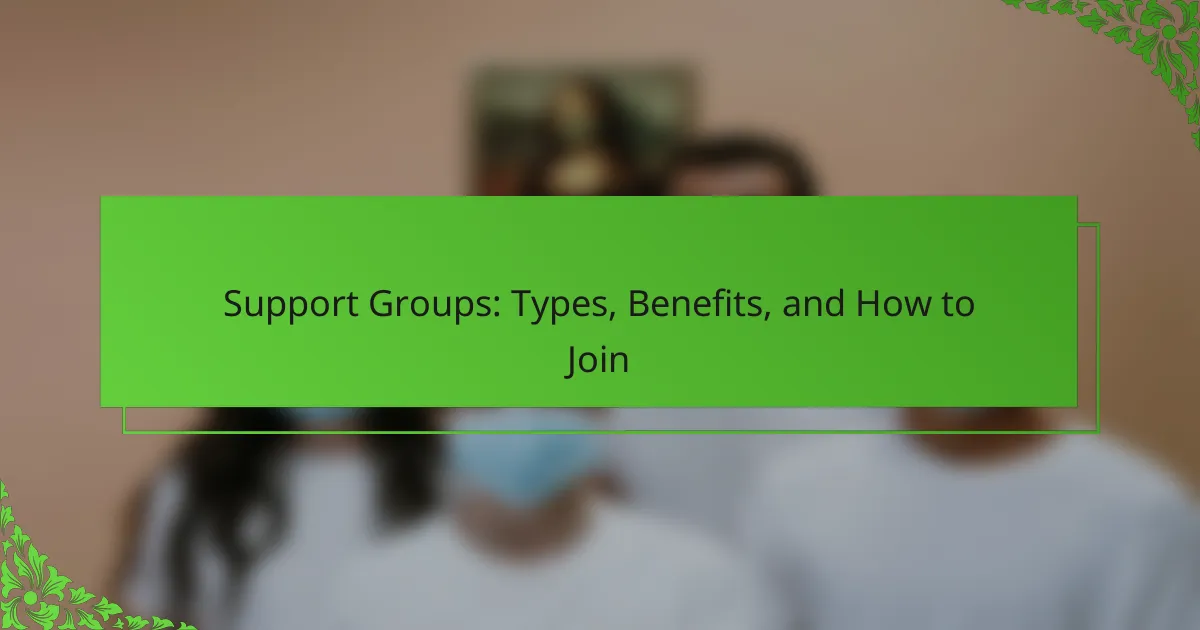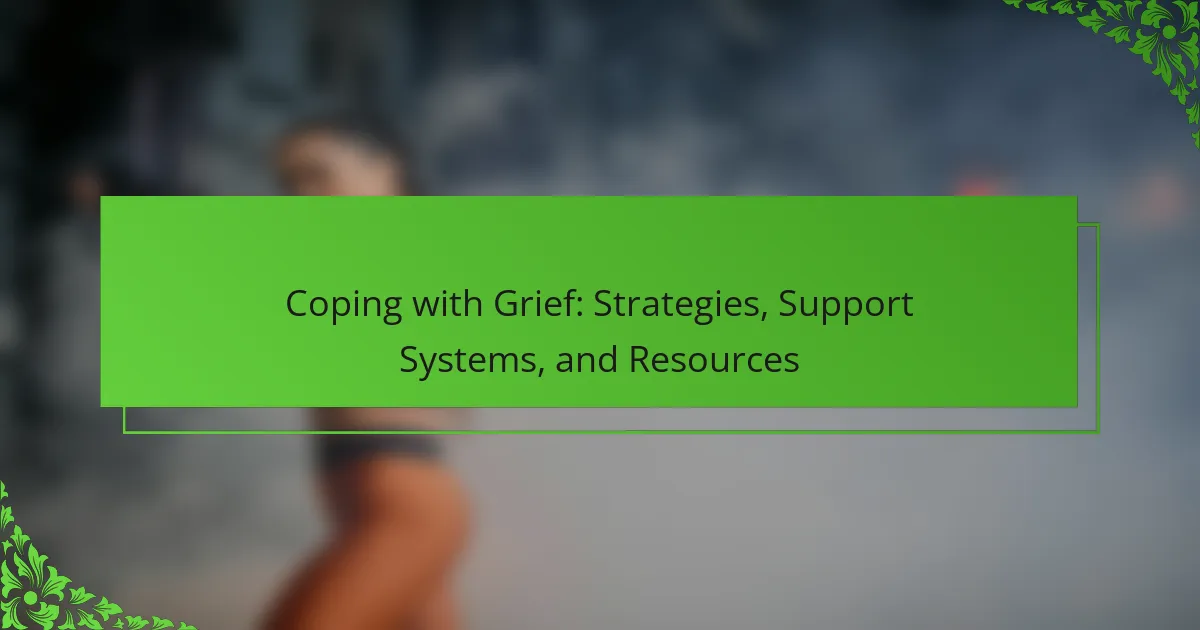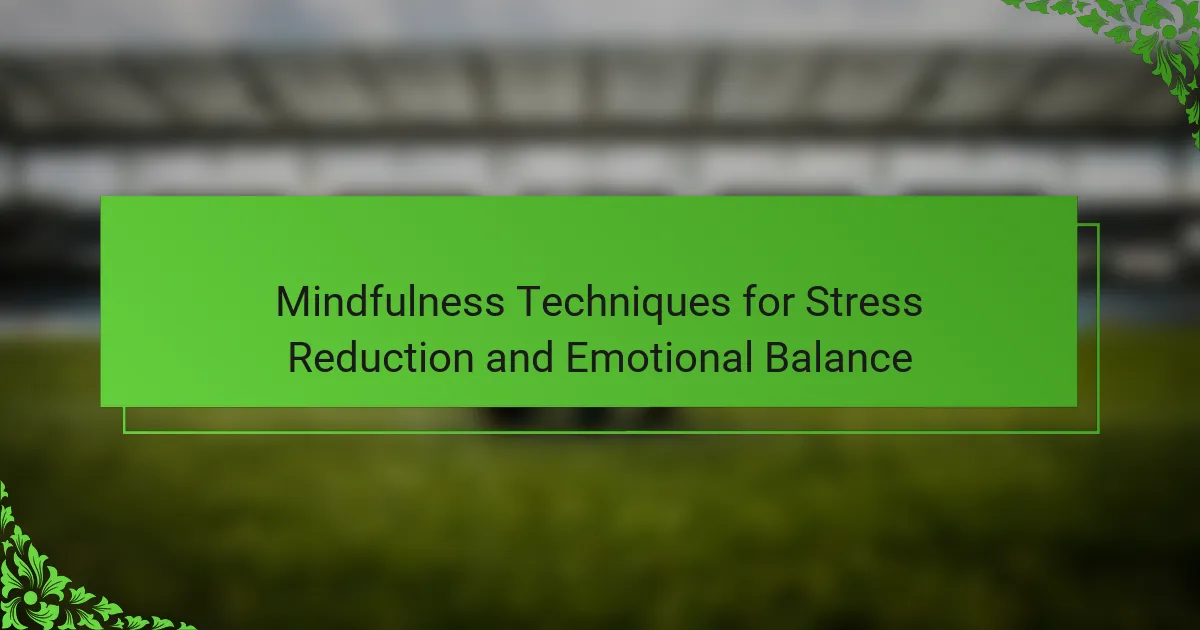Support groups provide emotional support and foster community among individuals facing similar challenges. This article explores various types of support groups, highlights their benefits, and offers guidance on how to join one. Understanding the unique attributes of different groups can help you find the right fit for your needs. Engaging effectively in these environments enhances personal growth and connection.

What are the different types of support groups?
Support groups can be categorized into various types based on their focus and structure. Common types include peer support groups, which offer emotional and social support; professional-led groups, guided by therapists or counselors; and online support groups, providing virtual connections. Additionally, there are specific groups for conditions like addiction, chronic illness, and grief. Each type serves unique needs, fostering community and shared experiences among participants.
How do peer-led support groups function?
Peer-led support groups function by enabling individuals with shared experiences to connect, share insights, and provide emotional support. These groups promote a sense of community and belonging, empowering members to discuss challenges and celebrate successes. Typically, they operate through regular meetings, fostering an environment of trust and understanding. Members often take turns leading discussions, ensuring everyone has a voice and can contribute to the group’s dynamics.
What role do professional-led support groups play?
Professional-led support groups provide structured guidance, expert knowledge, and emotional support to participants. These groups foster a safe environment for sharing experiences and strategies. They enhance personal growth through facilitated discussions and evidence-based practices. Additionally, professional leaders can tailor sessions to address specific needs, ensuring relevance and effectiveness.
Which types of support groups are focused on specific conditions?
Support groups focused on specific conditions include those for chronic illnesses, mental health disorders, addiction recovery, and specific diseases like cancer or diabetes. These groups provide tailored support and resources for individuals facing similar challenges. Examples include cancer support groups, diabetes management groups, and addiction recovery programs. Each type addresses unique needs and fosters a sense of community among participants.
How do online support groups compare to in-person groups?
Online support groups offer flexibility and accessibility, while in-person groups provide personal connection and immediacy. Both formats have unique benefits that cater to different preferences. Online groups allow participants to join from anywhere, facilitating broader participation. In-person groups foster a sense of community through face-to-face interaction. Ultimately, the choice depends on individual needs for convenience versus personal engagement.

What are the key benefits of joining a support group?
Joining a support group offers emotional support, shared experiences, and a sense of community. Participants often report improved mental health, increased coping skills, and reduced feelings of isolation. Support groups can provide valuable resources and information relevant to specific challenges. Engaging with others facing similar issues fosters understanding and validation, enhancing overall well-being.
How do support groups enhance emotional well-being?
Support groups significantly enhance emotional well-being by providing a sense of belonging and shared experience. They offer emotional support, reduce feelings of isolation, and promote coping strategies. Participants often report improved mood and resilience, as these groups foster open communication and understanding. Engaging with others who face similar challenges can lead to increased self-esteem and a greater sense of purpose.
What social benefits can be gained from support groups?
Support groups offer numerous social benefits, including enhanced emotional support, increased sense of belonging, and improved coping strategies. Participants often experience reduced feelings of isolation through shared experiences. Additionally, these groups foster connections that can lead to lasting friendships. As a result, individuals may gain confidence and motivation from the collective encouragement.
How can support groups provide practical advice and resources?
Support groups provide practical advice and resources by fostering shared experiences and knowledge exchange. Members often share coping strategies, recommend helpful literature, and provide emotional support. Additionally, many groups compile resources such as local services, workshops, and online tools, enhancing access to vital information. This collaborative environment empowers individuals to navigate challenges effectively, promoting resilience and community engagement.

How can I find a support group that fits my needs?
To find a support group that fits your needs, start by identifying your specific challenges or goals. Research local and online options through community centers, hospitals, or mental health organizations. Consider group size, meeting frequency, and facilitator qualifications. Reach out to group leaders to ask about their approach and member experiences. Joining a trial session can help determine if the group is a good fit.
What steps should I take to research local support groups?
To research local support groups, start by identifying your specific needs. Use online directories and community resources to find relevant groups. Contact local health organizations or community centers for recommendations. Attend introductory meetings to assess fit and gather information.
How can I evaluate the effectiveness of a support group?
To evaluate the effectiveness of a support group, assess participant engagement, satisfaction, and perceived benefits. Collect feedback through surveys or discussions to understand the group’s impact on members’ goals and emotional well-being. Consider the frequency of attendance and the quality of interactions as indicators of success.
What online platforms offer support group directories?
Several online platforms offer support group directories. Notable examples include Psychology Today, Mental Health America, and SupportGroups.com. These platforms provide comprehensive listings of various support groups based on specific needs, such as mental health, addiction, or chronic illness. Users can easily search for local or virtual options, enhancing accessibility and connection to necessary resources.

What should I expect when attending my first support group meeting?
Expect a welcoming environment and the opportunity to share experiences. You’ll likely encounter diverse participants who understand your challenges. Meetings typically include introductions, sharing personal stories, and discussing coping strategies. This supportive atmosphere fosters connection and understanding, helping you feel less isolated.
How can I prepare for my first session?
To prepare for your first session, familiarize yourself with the group’s focus and guidelines. Understand the benefits of sharing experiences and supporting others. Consider writing down your thoughts or questions to share. Arrive early to settle in and meet other members.
What common protocols are followed in support group meetings?
Common protocols for support group meetings include confidentiality, respectful communication, and active participation. These guidelines foster a safe environment for sharing experiences and support among members. Additionally, groups often establish a structured agenda to facilitate discussions and ensure everyone has an opportunity to speak. Regular attendance and commitment to the group’s goals are also encouraged to enhance group cohesion and effectiveness.

What challenges might I face when joining a support group?
Joining a support group may present challenges such as discomfort in sharing personal experiences, fear of judgment, and difficulty in establishing trust. These barriers can hinder participation and limit the benefits of group support. Additionally, varying group dynamics and commitment levels can affect engagement.
How do personal barriers affect participation in support groups?
Personal barriers significantly hinder participation in support groups. Factors such as fear of judgment, lack of time, and emotional discomfort often prevent individuals from joining. Additionally, personal beliefs about vulnerability can create reluctance to engage. Addressing these barriers is crucial for enhancing participation and fostering a supportive environment.
What are the common misconceptions about support groups?
Many believe support groups are only for severe issues, but they also help with everyday challenges. Common misconceptions include the idea that they are only for mental health problems, that they lack structure, and that they are ineffective. Some think participants must share personal stories, while others believe they will be judged. Additionally, many assume support groups are only for specific demographics, overlooking their universal accessibility. Understanding these misconceptions can encourage broader participation and utilization of support groups for various needs.

How can I contribute effectively to a support group?
To contribute effectively to a support group, actively listen, share personal experiences, and offer encouragement. Building trust enhances group dynamics and fosters a supportive environment.
Engage by asking open-ended questions to facilitate discussion. Respect confidentiality to ensure members feel safe sharing. Regular attendance strengthens connections and shows commitment to the group’s goals.
Consider these key actions:
1. Be present and attentive during meetings.
2. Share relevant personal stories to inspire others.
3. Offer constructive feedback and support.
4. Respect differing opinions and experiences.
5. Follow up with members outside meetings when appropriate.
What are the best practices for sharing personal experiences?
Sharing personal experiences in support groups fosters connection and healing. Best practices include active listening, maintaining confidentiality, and being respectful. Encourage others to share by creating a safe environment. Use “I” statements to express feelings without blaming. Focus on shared experiences to build rapport.
How can I support others in the group while maintaining boundaries?
You can support others in the group while maintaining boundaries by practicing active listening and expressing empathy. Respect personal space and avoid giving unsolicited advice. Establish clear limits on your emotional involvement to protect your well-being. Encourage open communication about boundaries within the group to foster a supportive environment.
What strategies can enhance group dynamics and participation?
To enhance group dynamics and participation in support groups, implement strategies that foster engagement and trust. Encourage open communication, set clear goals, and promote active listening among members.
Utilize icebreakers to build rapport and create a safe space for sharing. Facilitate group activities that require collaboration, allowing members to connect and support each other. Regularly solicit feedback to adapt group dynamics to meet participants’ needs effectively.

What unique attributes should I consider when choosing a support group?
When choosing a support group, consider the specific needs, shared experiences, and group dynamics. Unique attributes like the group’s focus, facilitator qualifications, and size can significantly impact your experience. Look for groups that align with your goals, whether emotional support, practical advice, or social interaction. Assess the group’s accessibility and meeting format, as these factors affect participation and comfort.
How does the focus of a support group impact its effectiveness?
The focus of a support group significantly impacts its effectiveness by aligning members’ goals and fostering a sense of community. A clear focus enhances engagement, ensuring that discussions remain relevant and supportive. For instance, groups centered on specific issues, like grief or addiction, often provide targeted resources and shared experiences that resonate deeply with participants. This specialized approach can lead to improved emotional outcomes and stronger connections among members. Ultimately, a well-defined focus cultivates a safe space for open dialogue and personal growth.
What role does group size play in the success of support groups?
Group size significantly impacts the success of support groups. Smaller groups often foster deeper connections and more personal sharing, while larger groups provide diverse perspectives and resources. Optimal group size typically ranges from 5 to 15 participants, balancing intimacy with variety. Smaller sizes can enhance trust, encouraging members to open up, while larger sizes can introduce challenges in managing dynamics and ensuring everyone has a voice.
How do cultural considerations shape the experience of support groups?
Cultural considerations significantly influence the experience of support groups by shaping communication styles, values, and expectations. Different cultures may prioritize collective support over individual expression, affecting how members share experiences. For instance, in collectivist cultures, group harmony is crucial, leading to a focus on group cohesion rather than personal narratives. Additionally, language barriers can impact participation and understanding, necessitating culturally sensitive facilitation. Recognizing these cultural dynamics enhances the effectiveness of support groups by fostering inclusivity and respect for diverse backgrounds.

What are some common mistakes to avoid when joining a support group?
Joining a support group can be beneficial, but avoiding common mistakes is crucial for a positive experience.
First, don’t choose a group based solely on convenience; ensure it aligns with your specific needs. Second, avoid being overly critical of yourself or others; support is about understanding and compassion. Third, don’t hesitate to share your feelings; openness fosters connection. Fourth, steer clear of unrealistic expectations; progress takes time. Lastly, refrain from dominating discussions; allow space for others to share their experiences.
How can unrealistic expectations hinder your experience?
Unrealistic expectations can significantly hinder your experience in support groups. They may lead to disappointment, frustration, and a lack of engagement. When individuals expect immediate results or perfect solutions, they often overlook the gradual process of healing and connection. This mindset can prevent members from fully participating and benefiting from the support offered. Recognizing and adjusting these expectations fosters a more positive and productive group dynamic.
What pitfalls should I be aware of regarding confidentiality?
Confidentiality in support groups is crucial to protect members’ privacy. Be aware of the potential for breaches through casual conversations outside the group, unintentional sharing of personal information, or lack of clear confidentiality agreements. Establishing trust and clear guidelines can help mitigate these risks.
How can I ensure my participation is constructive and respectful?
To ensure your participation in support groups is constructive and respectful, actively listen and share thoughtfully. Respect differing opinions and maintain confidentiality to foster a safe environment. Engage positively by offering support and encouragement, which enhances group dynamics.
What tips can help maximize the benefits of attending support groups?
To maximize the benefits of attending support groups, actively participate, share experiences, and listen to others. Establish connections with members and attend regularly for consistency. Setting personal goals for each session can enhance focus and motivation.



